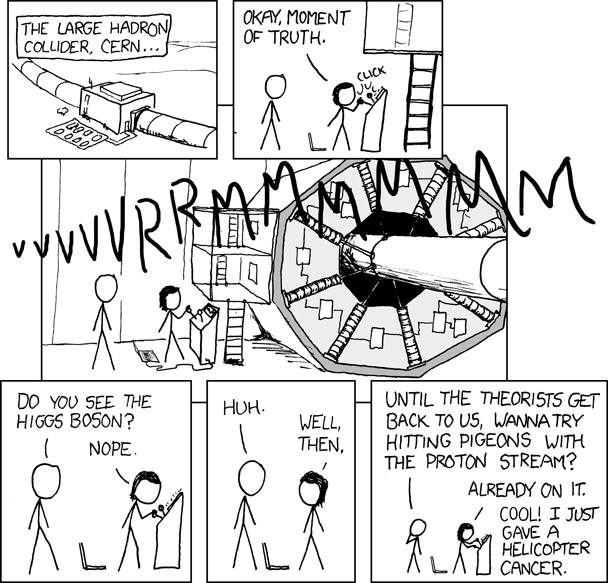Doomsday fears spark lawsuit over colliderCritics worry about mini-black holes, strangelets; experts reject claims
By Alan Boyle
Science editor
MSNBC
updated 10:23 a.m. CT, Fri., March. 28, 2008
The builders of the world's biggest particle collider are being sued in federal court over fears that the experiment might create globe-gobbling black holes or never-before-seen strains of matter that would destroy the planet.
Representatives at Fermilab in Illinois and at Europe's CERN laboratory, two of the defendants in the case, say there's no chance that the Large Hadron Collider would cause such cosmic catastrophes. Nevertheless, they're bracing to defend themselves in the courtroom as well as the court of public opinion.
The Large Hadron Collider, or LHC, is due for startup later this year at CERN's headquarters on the French-Swiss border. It's expected to tackle some of the deepest questions in science: Is the foundation of modern physics right or wrong? What existed during the very first moment of the universe's existence? Why do some particles have mass while others don't? What is the nature of dark matter? Are there extra dimensions of space out there that we haven't yet detected?
Some folks outside the scientific mainstream have asked darker questions as well: Could the collider create mini-black holes that last long enough and get big enough to turn into a matter-sucking maelstrom? Could exotic particles known as magnetic monopoles throw atomic nuclei out of whack? Could quarks recombine into "strangelets" that would turn the whole Earth into one big lump of exotic matter?
Former nuclear safety officer Walter Wagner has been raising such questions for years - first about an earlier-generation "big bang machine" known as the Relativistic Heavy-Ion Collider, and more recently about the LHC.
Last Friday, Wagner and another critic of the LHC's safety measures, Luis Sancho, filed a lawsuit in Hawaii's U.S. District Court. The suit calls on the U.S. Department of Energy, Fermilab, the National Science Foundation and CERN to ease up on their LHC preparations for several months while the collider's safety was reassessed.
"We're going to need a minimum of four months to review whatever they're putting out," Wagner told me on Monday. The suit seeks a temporary restraining order that would put the LHC on hold, pending the release and review of an updated CERN safety assessment. It also calls on the U.S. government to do a full environmental review addressing the LHC project, including the debate over the doomsday scenario.
On Monday, District Judge Helen Gillmor assigned the case to a magistrate judge, Kevin S.C. Chang, for an initial conference on June 16. Wagner said he planned to ask for a more immediate hearing on the request for a restraining order - that is, once he has served the federal government with the court papers.
The case is currently being handled by the U.S. attorney's office in Hawaii, where Wagner and Sancho both live,`but that may not necessarily be where the legal proceedings end up. The Justice Department's Environmental and Natural Resources Division, based in Washington, is also being brought in on the case, assistant U.S. attorney Derrick Watson told me in an e-mail Wednesday.
In Washington, Justice Department spokesman Andrew Ames noted that the court papers had not yet been received. "We don't have any comment," he told me Thursday. "We'll comment in court when it's appropriate."
Debating doomsday
The defense attorneys would likely dwell on the regulatory and procedural questions rather than the worries over a cosmic catastrophe. Those worries have been around for years, and most physicists have scoffed at them for almost as long. The doomsday scenarios raised by Sancho and Wagner include:
Runaway black holes: Some physicists say the LHC could create microscopic black holes that would hang around for just a tiny fraction of a second and then decay. Sancho and Wagner worry that millions of black holes might somehow persist and coalesce into a compact gravitational mass that would draw in other matter and grow bigger. That's pure science fiction, said Michio Kaku, a theoretical physicist at the City College of New York. "These black holes don't live very long, and they have microscopic energy, and so they are harmless," he told me.
Strangelets: Smashing protons together at high enough energies could create new combinations of quarks, the particles that protons are made of. Sancho and Wagner worry that a nasty combination known as a stable, negatively charged strangelet could theoretically turn everything it touches into strangelets as well. Kaku compared this to the ancient myth of the Midas touch. "We see no evidence of this bizarre theory," he said. "Once in a while, we trot it out to scare the pants off people. But it's not serious."
Magnetic monopoles: One theory suggests that high-energy particle collisions might give rise to massive particles that have only one magnetic pole - only north, or only south, but not the north-south magnetism that dominates nature. Sancho and Wagner worry that such particles could be created in the LHC and start a runaway reaction that converts atoms into other forms of matter. But physicists have seen no evidence of such reactions, which should have occurred already as the result of more energetic cosmic-ray collisions in Earth's upper atmosphere.
The cosmic-ray argument has been applied to the black-hole and strangelet scenarios as well. If such dangerous things can be created, why haven't they already eaten up Earth, along with other planets, stars or whole galaxies in the billions of years since the universe arose? To answer that question, Sancho and Wagner pose a counterargument: Perhaps cosmic-ray collisions really are creating tiny black holes or strangelets, but those little bits of doomsday zip by too fast to cause any trouble. In the LHC, they say, the bad stuff could hang around long enough to be captured by Earth's gravity and set off a catastrophe.
In response, particle physicists are developing counter-counterarguments - based on their theoretical work as well as data from astronomical observations and experiments at the Relativistic Heavy-Ion Collider. For instance, the physicists would say that enough of the doomsday particles still should have been captured by neutron stars or cosmic gas clouds to have an impact. No such impact has ever been seen. Therefore, no doomsday.
CERN spokesman James Gillies told me that a 2003 assessment of the doomsday scenarios was being updated with the new information. Release of that updated report - the one that Sancho and Wagner apparently have been waiting for - is "imminent," Gillies told me.
Questions about the doomsday scenarios may well come up at CERN on April 6, during a public open house at the LHC. Some researchers have gotten the word to be prepared to talk about microscopic black holes and strangelets if asked.
Reality check
Saying something is absolutely impossible doesn't always come easy. Some scientists find it difficult to state categorically that such-and-such a theoretical catastrophe has no chance of happening, and Fermilab spokeswoman Judy Jackson told me that the doomsayers have "cynically distorted" that natural reluctance to rule out even the most outlandish theoretical possibilities.
The doomsaying can continue as long as scientists hold out even a tiny sliver of uncertainty. Jackson cited the example of Paul Dixon, a psychology professor at the University of Hawaii at Hilo who has been saying for more than a decade that experiments at Fermilab's Tevatron accelerator are in danger of touching off an artificial supernova. Dixon is still going strong: He submitted an affidavit in support of the LHC lawsuit filed by Sancho and Wagner.
The current lawsuit could well be decided not by scientific arguments but rather by narrower regulatory issues. On that point, Jackson said that Fermilab has followed U.S. environmental regulations, just as CERN has followed European regulations. "Of course there are plenty of environmental laws and regulations, and they have all been followed to the letter," she said.
However, Jackson said CERN shouldn't be held to U.S. requirements when it comes to operating the LHC - even if the collider happens to be using magnets built by Fermilab. "Just because we built them doesn't mean we have any say over French environmental regulations," she said.
For his part, Wagner said he hoped Fermilab and the other defendants in the lawsuit would take another look at the doomsday scenarios - and speculated that a restraining order might not even be necessary. He noted that the startup schedule for the LHC has been repeatedly delayed, which would give more time for further safety assessments. (CERN's schedule currently calls for first collisions by the end of August, and the word is that the collider may not reach its full power of 14 trillion electron-volts until next year.)
Wagner suggested that cosmic-ray observations by the Pierre Auger Observatory and the yet-to-be-launched Gamma-ray Large Area Space Telescope, or GLAST, could shed new light on the debate. "The way I look at it, this should be a basis to look for more funding to find a solution to the problems we raised," he told me.
http://www.msnbc.msn.com/id/23844529/
























































